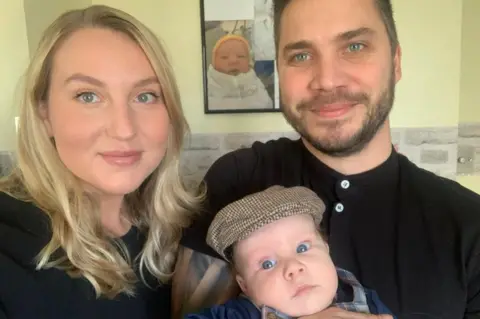Colchester parents 'ecstatic' after baby approved for £1.7m drug
 Megan Willis
Megan WillisA baby with a fatal condition has had his parents' request for treatment using the world's most expensive drug approved by the NHS after a campaign.
Ten-month-old Edward, from Colchester, has severe spinal muscular atrophy (SMA), meaning he lacks a protein vital for muscle development.
He will receive the new gene therapy Zolgensma, which usually costs £1.79m.
Edward's mother Megan Willis, 29, said: "We feel incredibly lucky, happy and relieved."
His parents previously said they felt abandoned in their "race against time" for Edward to receive the drug, which they hoped would transform his life.
Doctors said the drug, which contains a replica of the missing gene SMN1, needed to be given as a one-off treatment as early as possible to halt the progression of the disease.
Ms Willis said it could be the difference between Edward being able to stand or not, and she was prepared to organise a protest if the decision had been delayed much longer.
 Megan Willis
Megan Willis"We have been fighting for so long for this drug. We can't believe it is finally happening. We just hope we don't have to wait a long time," she said.
"Edward turns one in September and time is of the essence."
Zolgensma is thought to be the most expensive drug in the world, at a usual cost of £1.79m per patient, though NHS England said it had negotiated an undisclosed discount.
When it was approved for use by the NHS in March, guidelines set by the National Institute for Health and Care Excellence said it should only be used for babies under six months old who were not already being treated, which would have excluded Edward.
But it added a decision on whether to give it to other babies would be dealt with on a case-by-case basis.
About 65 babies are born with SMA in England each year. It causes muscle weakness and affects movement and breathing, meaning most babies do not live past the age of two without intervention.
In studies, Zolgensma has helped babies breathe without a ventilator, sit up on their own and crawl and walk after a single treatment.
 Megan Willis
Megan WillisEdward, who was diagnosed at two months old, was receiving injections of another drug called Spinraza every four months at Addenbrooke's Hospital in Cambridge.
Spinraza can help slow degeneration in some patients, but is a treatment rather than a cure and involves regular injections in the spine for life, compared to the one-off injection of Zolgensma.
Ms Willis said she was now looking forward to enjoying life with Edward for the first time without the battle to pay for the drug "looming" over them.
"Our aim is to get him walking. I think for the first time we can actually plan his future, knowing he has got the best possible treatment out there for his condition," she said.

Find BBC News: East of England on Facebook, Instagram and Twitter. If you have a story suggestion email eastofenglandnews@bbc.co.uk